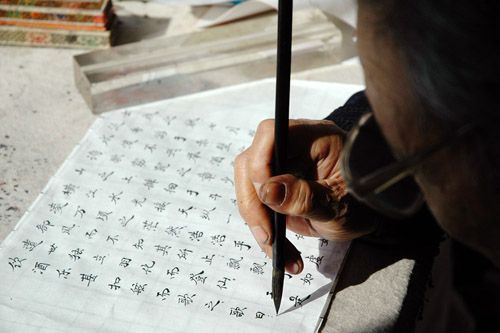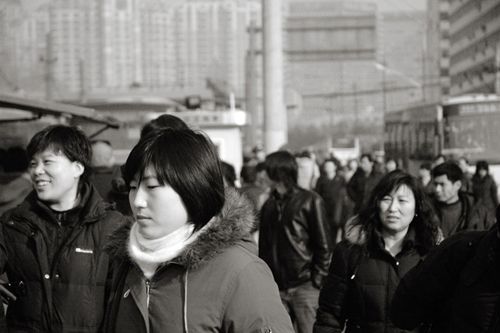Everyday Chinese Etiquette
* Don’t lose your temper.
* If you’re invited to a home, bring a present like fruit, sweets or tea. Avoid giving clocks or pears! (see below).
* The floor is seen as dirty, don’t sit on it, if you want to, put newspaper down.
* Use your common sense- if someone doesn’t seem to like a certain topic of conversation, don’t force the issue.
* Take care not to criticise people too harshly in front of others.
* Don’t expect vast amounts of privacy – there’s not enough space for it!
* Try not to worry about people spitting, they are not doing it to insult you.
Cultural Misunderstandings!
Most people who haven’t been to China imagine a country with very complex, formal etiquette. Then when they visit China they come away with the impression that Chinese people are rather rude! The true situation is that Chinese people are just like any others- friendly and open once you get to know them, more careful when you first meet.
One of the first things a visitor may note is the areas of conversation that are and are not taboo. It’s perfectly acceptable to ask someone you don't know very well if they’re married, and if not why not. The same applies to the question of children. On the other hand, Chinese people tend to stray away from more in depth conversations about relationships, and questions of politics. The reluctance to discuss politics is not only a consequence of China's recent history, but is something also present, although to a lesser extent, in the greater Chinese diaspora. It stems from the Confucian ideas of respect for elders and rulers, and the tradition or ideal of rule by scholars and educated people.
When foreigners first visit China, not understanding a word of Chinese, it’s easy to think of Chinese people as loud, brusque and argumentative. It’s true Chinese people seem to talk louder than everyone else, but apart from that, all of these things are cultural misunderstandings, and here’s why:
The English word ‘polite’ is usually translated into one of two ways. The first word is Lĭmào (礼貌). This is an admirable trait, to not be lĭmào is deplorable. The other word is kèqi (客气). Kèqi means polite, but to be kèqi is not a good thing. Kèqi implies that by being polite, someone is hiding their true feelings and thus keeping a distance between the two of you – and what could be more terrible than that? Ideally, you want to be very lĭmào, but not at all kèqi, admittedly a difficult tightrope to walk.
Where a Westerner in China may think a Chinese person is being brusque, they are actually just avoiding excessive kèqi. As Chinese people become closer friends, so they drop the kèqi, to the extent that it’s perfectly acceptable for good friends to make the most frankly critical remarks to each other’s faces. This is not being rude, it’s a sign of trust.
If your Chinese friend doesn’t say please and thank you very much, it’s not because they’re not grateful, but because they don’t want to appear obsequious. They wouldn’t think twice about passing you the soy sauce, so why should you say thank you when they do it? If two people on the next table appear to be having a blazing row, they’re not. To genuinely lose one’s temper in public would be an utterly shameful act. Those people are simply enjoying a bit of banter, exchanging opinions, not being kèqi, and all at the volume that Chinese people like to talk at. A noisy mealtable is, incidentally, a happy one. If everyone’s really quiet, the host will probably try to jolly things up a bit with a few raucous, gregarious toasts.
******
A few guidelines
If you’re invited to somebody’s house as a guest, it’s polite to bring a present. As a foreigner, it’s a good idea to bring some cultural tradition of your country, if not then sweets, tea, fruit and flowers are all sure bets. Cigarettes and alcohol are great if the person partakes, but obviously a bit silly otherwise.
Things not to give as presents are clocks and pears. Because Chinese is a language with a lot of synonyms to ‘give a clock’ in Chinese sounds like you are going to someone’s funeral, and to share a pear with someone sounds like you are going to separate from them.
Other things best avoided include the colours black and white, because black is associated with dirt and dishonesty, and white is the colour of funerals. Anything connected with the number four is also not that good an idea, since its pronunciation is similar to the word death. This association is so strong that property on the fourth floor is usually cheaper than anywhere else.
When Chinese people meet for the first time, it’s not uncommon to exchange business cards, even if they're not meeting in a business situation. If you’re going to be in China for a long time, it might be a nice idea to get some printed. When accepting a business card proffered, take it with two hands, and take at least a cursory glance over the details before putting it away.
Nowadays Chinese are most likely to shake hands when they meet strangers, especially if it’s a foreigner. Don’t squeeze too tightly or hold on for too long, it’s a handshake not an arm wrestle!
On weddings and birthdays, it’s traditional to give money in a red envelope, a Hóng Bāo (红包).
Chinese people like to be punctual, waste their time and feel their wrath!
Spitting. A lot of Chinese people do like a good spit. Don’t be perturbed if someone hawks up a nice big green one just as you walk past, they are not doing it to insult you. They’re just trying to clear their sinuses a bit. Spitting though, is definitely on the way out, and most urbanites consider it highly uncouth. Beware if you spit on the street in Beijing, you face an on the spot fine.
Face (Miànzi – 面子 or lian3 脸) is a rather complicated issue which some people take more seriously than others. Basically it boils down to embarrassment – don’t embarrass people, but particularly not in front of strangers.
Most importantly of all, remember this is a country that developed in isolation from Western influences for thousands of years, so if it wasn’t a bit different something would be very wrong. Relax, sit back, take the good with the interesting, and remember when in China do as Chinese do or rather, Rù xiāng suí sú - 入乡随俗 (upon entering the locality, follow the customs).
© Beijing-visitor.com









